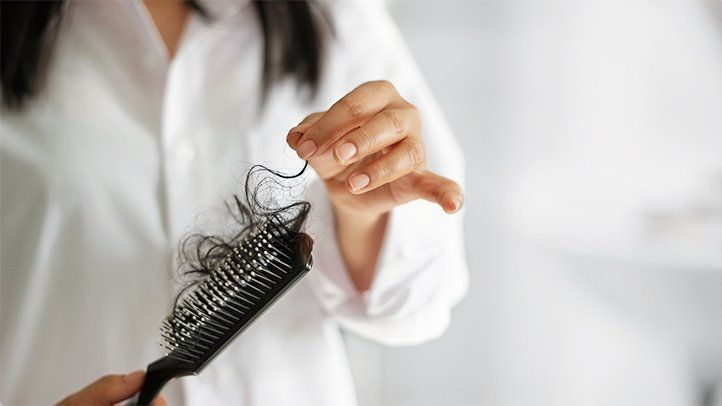There is a lot, a woman has to go through during menopause. Insomnia, mood swings, hot flashes, and hair loss are common problems.
But hair fall in menopause is the most pressing concern for women. All the other symptoms generally disappear with time except the impact of menopause hair loss.
Excessive hair loss during menopause results in a nutritional deficiency in the scalp triggering a group of male hormones known as androgens.
Too much androgen production can lead to thinning of hair follicles resulting in extreme hair loss. In some women, it can lead to unwanted facial hair growth. For example, women can have peach fuzz and chin hair due to excessive androgen secretion. So, how can excessive hair loss be stopped during menopause? Let’s answer this in four easy points:
- Keep a check on your stress levels.
Every person goes through stressful moments in their daily lives. However, if that feeling of anxiety is too frequent throughout your day, that can be a reason for excessive hair loss.
Experts believe that stress reduces the estrogen levels in the body, therefore, leading to anxiety, mood swings, and depression. The less stressed you are, the less hair you lose.
- Get your body moving.
The last thing you want menopause to do is get the better of you. Get moving, head out for a walk with your friend; you can also consider joining the gym and going out biking, etc.
The aim is to keep your body in an active state because lying in bed for hours will result in weight gain, insomnia, and anxiety. In contrast, an active lifestyle will help maintain hormonal balance.
For people who are wondering how to increase their hair fast enough, hormonal balance and an active lifestyle are the two keys to remember.
- Take a healthy diet.
Nothing heals hair loss faster than a healthy and balanced diet. Your body needs fruits, veggies, and whole grains to curb the nutritional deficiency.
You can also add mono-saturated oils like sesame and olive, folic acid supplements, vitamin B6 and green tea for faster and better restoration of lost hair.
Moreover, it would be best to incorporate essential fatty acids into your diet. You can add walnuts, almonds, flaxseeds, tuna, salmon, etc.
Lastly, do not forget to drink lots of water. H2O provides much-needed balance to the diet and flushes out harmful toxins accumulated in our bodies.
- Stay away from styling tools.
Your hairdryers and dyes can wait for some time. The use of styling tools removes the moisture from the scalp. As a result, hair starts thinning out.
Dyes too contain harmful chemicals that can damage the scalp. If you want to dye, it would be best to use a natural hair color instead of chemical ones. You can use conditioners to keep your scalp nourished and hydrated to promote hair growth.
Moreover, it would be best not to swim during the days when you lose excessive hair. Chlorine in the pool water can lead to breakage. However, if you want to swim, we recommend wearing a pool cap before diving in it.
Final Thoughts
Hair loss during menopause is a common occurrence. However, the good news is that you do not have to do anything outside the box to heal the problem.
If you can keep yourself active and eat healthy foods, you can quickly restore your hair. In the meantime, do remember not to expose your hair to dust, debris, and sunlight.
UV rays of the sun and wind can remove the scalp’s moisture resulting in hair thinning. Therefore, follow these four points, and you will have your shiny and thick hair back.
